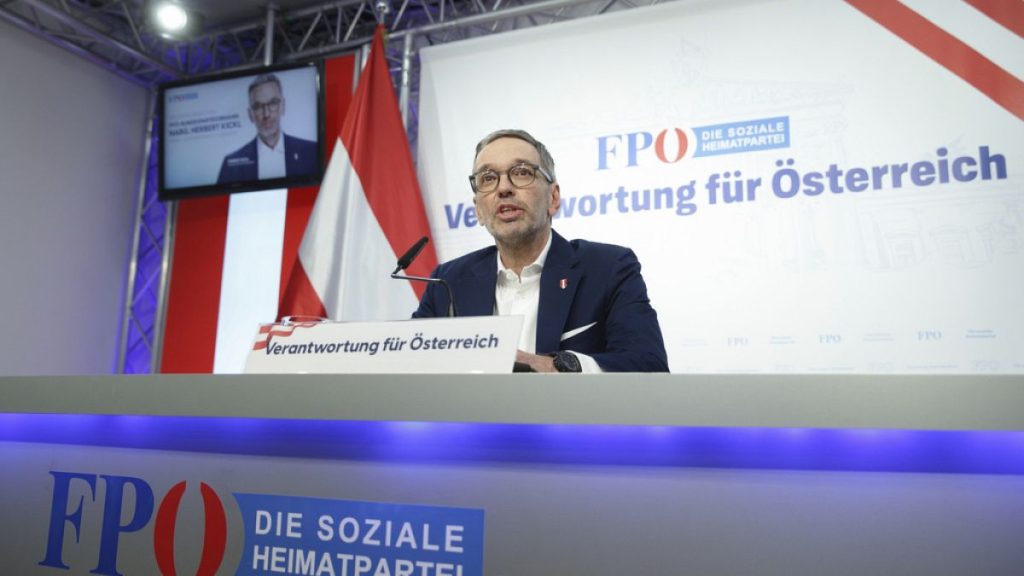The Austrian political landscape is currently navigating a complex and potentially volatile situation following the September parliamentary elections. Herbert Kickl, leader of the far-right Freedom Party (FPÖ), has emerged as a central figure in this unfolding drama. After securing a decisive victory in the elections, the FPÖ, under Kickl’s leadership, garnered 28.8% of the vote, surpassing the incumbent Chancellor Karl Nehammer’s conservative Austrian People’s Party (ÖVP). This electoral triumph positioned the FPÖ as the dominant force in parliament, yet the path to forming a government has been fraught with challenges and political maneuvering. President Alexander van der Bellen initially tasked Nehammer with forming a coalition, but the ÖVP’s reluctance to partner with the FPÖ under Kickl’s leadership led to an impasse. This refusal stemmed from deep-seated ideological differences and concerns about Kickl’s controversial past and hardline stances.
The political stalemate persisted for months, with attempts to forge alternative governing alliances failing to gain traction. By early January, the situation had reached a critical juncture, prompting Nehammer to announce his resignation, effectively conceding the ÖVP’s inability to form a viable government without the FPÖ’s participation. This resignation paved the way for President van der Bellen to turn to Kickl, officially tasking him with the formidable challenge of forming a ruling coalition. Kickl’s subsequent invitation to the ÖVP to engage in coalition talks represents a significant development, albeit one laden with uncertainty and potential pitfalls. The two parties have a history of clashes and conflicting ideologies, making the prospect of a successful coalition a complex undertaking.
Kickl’s invitation to the ÖVP, while ostensibly a gesture of cooperation, is underscored by a clear understanding of the political realities. The ÖVP remains the only viable coalition partner for the FPÖ given the current parliamentary composition. Kickl has emphasized the need for honesty and open dialogue in these talks, subtly reminding the ÖVP of the potential consequences of failing to reach an agreement. The looming threat of snap elections, coupled with the FPÖ’s surging popularity in recent polls, serves as a powerful incentive for the ÖVP to seriously consider the possibility of a coalition. Kickl recognizes that another election could further solidify the FPÖ’s position and potentially diminish the ÖVP’s influence.
Kickl has outlined a cautious approach to the coalition talks, acknowledging the need for incremental progress and a thorough assessment of the viability of such a partnership. He has stressed his desire to avoid delays and initiate a “massive political firefighting operation” to address the pressing issues facing Austria. Kickl’s characterization of the three months since the election as “lost” underscores his sense of urgency and determination to swiftly form a functioning government. The 100-day mark since the elections serves as a symbolic reminder of the political vacuum that has persisted, further emphasizing the need for decisive action.
The potential success of a far-right-conservative coalition remains uncertain. While the ÖVP’s options are limited, the ideological gulf between the two parties presents a significant hurdle. The ÖVP must carefully weigh the potential benefits of joining forces with the FPÖ against the risk of alienating its more moderate supporters and further polarizing the Austrian electorate. The FPÖ, under Kickl’s leadership, has adopted a hardline stance on issues such as immigration and integration, policies that could clash with the ÖVP’s more centrist approach.
The ongoing coalition talks represent a pivotal moment in Austrian politics. The outcome will significantly shape the country’s future direction and determine whether the FPÖ, under its controversial leader, will have the opportunity to implement its agenda. The negotiations will likely be arduous, with both parties maneuvering to secure their interests and minimize compromises. The potential for a successful coalition hinges on the willingness of both sides to bridge their ideological differences and find common ground. The alternative – another snap election – carries its own set of risks and uncertainties, leaving Austria in a state of political limbo. The stakes are high, and the eyes of the nation are fixed on the unfolding drama.

